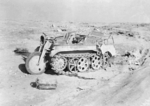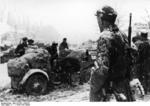SdKfz 2 Kettenkrad
| Country | Germany |
| Manufacturer | NSU-D-Rad Vereinigte AG, Neckarsulm, Germany |
| Primary Role | Other |
Contributor: Alan Chanter
ww2dbaseDuring late 1939 design work commenced for a proposed series of semi-track vehicles for the German army that would be simpler and quicker to produce than existing vehicles. Although much development work was carried out and various prototypes covering the 1-ton, 3-ton, 6-ton, 9-ton and 16-ton categories were submitted for evaluation, ultimately only the 1-ton NSU HK101 vehicle would be rewarded with a production contract.
ww2dbaseThis unusual vehicle was initially intended to be used as an air-portable artillery tractor for very light weapons in German airborne units, being small enough to be carried in the cargo hold of the standard Junkers Ju52/3m transport aircraft. The Kleines Kettenkraftrad made its operational debut in the 1941 Crete landings, but following this German airborne troops were generally employed only as elite regular infantry, and so the Kettenkrad (as it was now named), with its intended role now largely redundant, became eagerly sought, despite its sluggish performance, by other units (particularly those serving on the eastern front) as a supply vehicle in difficult terrain, where other vehicles could not travel.
ww2dbaseThe Kettenkrad was, in essence, a combination of a motorcycle frame and front wheel married to a lightweight tracked suspension unit powered by a 1478cc 4-cylinder Opel car engine. Above the tracks was a truck–type body with lockers and rear facing seating for two passengers. Its only drawback was its lack of performance and low payload (although a special trailer, Sd.Anh.1, could be attached to it to improve its cargo capacity), both of which were intended to be corrected in a slightly larger HK102 developed at Neckarsulm. The HK102 was intended to carry five men or a 750-kg load. It was powered by a 2-litre Stump K20 engine, giving a maximum speed of 80 km/h, and was provided with hydraulic brakes and an epicyclic gearbox but the substantially improved vehicle was largely undeveloped by the time of Germany's surrender.
ww2dbaseDespite limited production, Kettenkrads were later widely issued to other branches of the German armed forces and became a highly popular light supply vehicle, particularly in the Russian and North African theatres of war. Some were even employed by the Luftwaffe to tow Me 262 jet fighters on airfield runways to conserve aircraft fuel supplies. However, by 1944, they were seen as an expensive luxury and production was discontinued. By this time some 8,345 had been constructed. After the war NSU went on to manufacture around 550 more Kettenkrads for agricultural use.
ww2dbaseOne interesting variant was a high-speed cable-laying vehicle for linking command posts with forward positions.
ww2dbaseSources:
Ian V. Hogg & John Weeks, The Illustrated Encyclopedia of Military Vehicles (Hamlyn, 1980)
Philip Trewbitt, Armoured Fighting Vehicles (Dempsey-Parr, 1999)
John Reed, Motorcycles in WWII (War Monthly, October 1981)
Wikipedia
Last Major Revision: Nov 2012
SPECIFICATIONS
SdKfz. 2 Kettenkrad
| Machinery | One 1,478cc 4-cyl Opel Olympia 38 petrol engine developing 36bhp @ 3,400rpm |
| Armament | None; capacity for up to 2 passengers or 325kg of cargo; 450kg towing capacity |
| Crew | 1 |
| Length | 2.74 m |
| Width | 1.00 m |
| Height | 1.01 m |
| Weight | 1.2 t |
| Speed | 80 km/h |
| Range | 100 km |
Photographs
 |  |
Please consider supporting us on Patreon. Even $1 per month will go a long way! Thank you. Please help us spread the word: Stay updated with WW2DB: |

- » US State Lawmaker John Winter Caught Using Racial Slur "Jap" and Apologized (11 Jun 2025)
- » Köln/Cologne Evacuated After Discovery of WW2 Bombs (4 Jun 2025)
- » US Women's Army Corps "Six Triple Eight" Awarded with Congressional Gold Medal (30 Apr 2025)
- » Race, Holocaust, and African-American WW2 Histories Removed from the US Naval Academy Library (7 Apr 2025)
- » US Government Plans to Purge WW2 Information (17 Mar 2025)
- » See all news
- » 1,173 biographies
- » 337 events
- » 44,924 timeline entries
- » 1,245 ships
- » 350 aircraft models
- » 207 vehicle models
- » 376 weapon models
- » 123 historical documents
- » 261 facilities
- » 470 book reviews
- » 28,468 photos
- » 365 maps
Chiang Kaishek, 31 Jul 1937